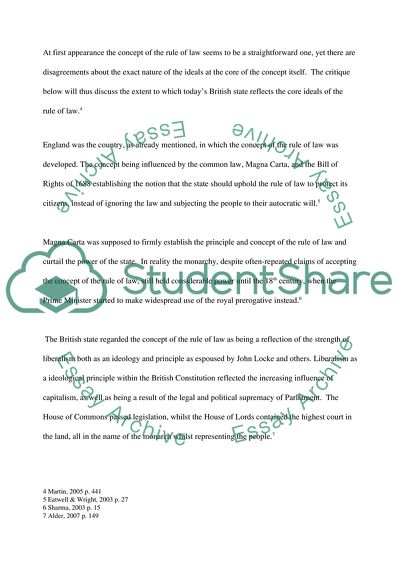Cite this document
(Contemporary British Politics and Contemporary Political Ideologies Essay, n.d.)
Contemporary British Politics and Contemporary Political Ideologies Essay. Retrieved from https://studentshare.org/politics/1718064-prime-minister-has-suggested-that-some-of-his-power-under-the-royal-prerogative-should-be-transferred-to-parliamentthis-has-led-for-renewed-calls-for-a-written-constitution-for-the-uk-describe-the-characteristics-sources-and-principles-of-the-british
Contemporary British Politics and Contemporary Political Ideologies Essay. Retrieved from https://studentshare.org/politics/1718064-prime-minister-has-suggested-that-some-of-his-power-under-the-royal-prerogative-should-be-transferred-to-parliamentthis-has-led-for-renewed-calls-for-a-written-constitution-for-the-uk-describe-the-characteristics-sources-and-principles-of-the-british
(Contemporary British Politics and Contemporary Political Ideologies Essay)
Contemporary British Politics and Contemporary Political Ideologies Essay. https://studentshare.org/politics/1718064-prime-minister-has-suggested-that-some-of-his-power-under-the-royal-prerogative-should-be-transferred-to-parliamentthis-has-led-for-renewed-calls-for-a-written-constitution-for-the-uk-describe-the-characteristics-sources-and-principles-of-the-british.
Contemporary British Politics and Contemporary Political Ideologies Essay. https://studentshare.org/politics/1718064-prime-minister-has-suggested-that-some-of-his-power-under-the-royal-prerogative-should-be-transferred-to-parliamentthis-has-led-for-renewed-calls-for-a-written-constitution-for-the-uk-describe-the-characteristics-sources-and-principles-of-the-british.
“Contemporary British Politics and Contemporary Political Ideologies Essay”. https://studentshare.org/politics/1718064-prime-minister-has-suggested-that-some-of-his-power-under-the-royal-prerogative-should-be-transferred-to-parliamentthis-has-led-for-renewed-calls-for-a-written-constitution-for-the-uk-describe-the-characteristics-sources-and-principles-of-the-british.


